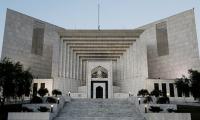Islamabad diary
Gen Raheel Sharif has done what he could and his term as army chief will be remembered fondly and with gratitude. He gave a fillip to the war against religious extremism and re-established the army’s control over areas taken over by the Taliban. And he broke the MQM’s stranglehold on Karachi and brought peace to the city. These are not small achievements.
When he took over as army chief Pakistan looked like a country on the verge of a nervous and physical breakdown, the Tehreek-e-Taliban Pakistan seeming more powerful than the state. Gen Raheel helped change this perception. And he put some backbone into the civilian structure.
But Zarb-e-Azb, the operation against Islamist extremism the army launched, now seems to have reached a plateau. The initial momentum has stalled, and the primary reason for this is that the army seems to have run out of ideas.
For the war on terrorism to be taken forward, two things should have accompanied the call to arms: institutional reform of the army and socio-economic reform in the country. This did not happen.
The army took on the Fata terrorists but it couldn’t break its residual links with the Haqqanis, the Quetta Shura and other Taliban elements. Nor could it snap links with the ‘mujahideen’ outfits, covert or functioning in the open, dedicated to fighting India for the liberation of Kashmir and for planting the green flag God knows where.
Thus there was a break with the past but not a complete break…which is why the suspicion entertained by both Pakistan’s friends and its enemies that we play double games has not entirely gone.
What do we need the Quetta Shura for? For exercising influence over the Taliban? Haven’t we had enough of this nonsense? Our Afghan policy from day one, with all its permutations, has been a recipe for disaster. What advantage do the Haqqanis bring us? And if for reasons not easy to understand we continue to nurture contacts with them, how in all conscience can we protest at the presence of Mullah Fazlullah and Omar Mansoor on Afghan soil?
The same holds true for our Indian and Kashmir liberators. What sense is there in permitting such outfits as the Jaish-e-Muhammad and even Lashkar-e-Taiba to function from our soil? How can a responsible state permit someone like Syed Salahuddin of the United Jihad Council to sit in Muzaffarabad and take responsibility for the Pathankot attack? A hundred denials from our side and one statement from Salahuddin nullify all our protestations. I asked a Kashmiri analyst and he said that Salahuddin dare not make such a claim on his own. So who is behind his bravado?
Then we get upset and raise the banner of outraged patriotism when President Obama or someone else asks us to fight terrorists of all hues and make no distinction between them. We end up being our own worst enemies and then blame the outside world for our troubles.
So under Gen Raheel Sharif’s watch while course was reversed on many aspects of terrorism, and Waziristani and Karachi gunfighters considered untouchable before were taken on, aspects of our strategic thinking, especially with regard to India, remained unchanged…frozen in time.
What will it take the army to come to the realisation that Pakistan is no walkover and that it has the means to deter any aggression from the eastern border? We don’t have to say, as Gen Raheel once did, that we are ready for any attack, hot or cold? Confident nations don’t keep thumping their chests all the time. If with our six lakh army and missile and nuclear arsenal we still, at every opportunity, have to trot out the bogey of aggressive Indian designs we may as well mothball our bombs and dismantle our defences.
The threat to Pakistan today is from Islamist extremism. This we planted in our soil ourselves with some help from the CIA. But in that endeavour we were partners with the CIA and we were heedless of the consequences of that fatal partnership. The army has taken on this menace and soldiers and officers in great numbers have shed their blood and lain down their lives. We owe it to our soldiers, we owe it to their blood, that we remain steadfast in this fight without being distracted, and pulled in different directions, by the Haqqanis, the Shuras, the Jaishs and the lashkars and the united jihad councils.
We should have drawn this clear line when Gen Raheel assumed command of the army. We should have certainly done this after the Peshawar school attack when even the most confused and dithering of our political leaders came round on the need to fight terrorism. But even after a year and a half of military operations we are still sticking to the old distinctions of useful and bad ‘jihadis’. Shouldn’t a more forceful line have been taken on this issue?
And the army and the other services with all their other work remain stuck in the property business. So far gone is this addiction that there seems no cure for it. Pakistan today needs a reformist, forward-looking army, one that can discard the old ways of thinking which brought the country so much grief. For does it take much to figure out that reformism and the property business don’t go together?
Fighting armies, professional armies don’t indulge in these activities.
Cantonments at one time were sited at a distance from civilian areas so that the military spirit was not contaminated by contact with civilians. And here we’ve turned commerce into one of the military’s chief preoccupations.
Not to be left behind the Intelligence Bureau has also entered the property market in a big way. Allah be praised.
Another weakness of these years is that whereas a drive against corruption was started in Sindh, and it was the right thing to do, nothing of the sort was attempted in the corruption-free land of the five rivers. True, corruption is not the army’s remit. But then for the sake of consistency no anti-corruption drive should have been initiated anywhere else. Or is it the case that whereas some things are permissible in other provinces, holy cows are not to be touched in Punjab?
Further guarding this tradition of not ruffling Punjab feathers is the accountability bureau itself whose chief, Chaudhry Qamar Zaman, remains a true son of Punjab, using different spectacles for Sindh and special ones for Punjab where his eagle eyes can detect no wrongdoing.
Meanwhile let us not forget the Supreme Court’s bold and timely step of protecting one of the main pillars of the country’s foreign policy – the hunting of the Houbara. The meat of this much-harassed bird is said to possess mythical powers. Thus a grave aphrodisiac crisis has been averted in the heart of the world of Islam.
The world of Islam is in turmoil. And outsiders are not far wrong in saying this strife will last for years to come. It is not for us to settle Saudi-Iran differences. Those differences are bigger than us. What we can do is look to ourselves. The Raheel opportunity we have half-used and half-missed. Let’s see what the future has in store for us.
Tailpiece: Timely tweet by Gen Bajwa that COAS not interested in extension. The right thing to say and not a moment too soon.
Email: bhagwal63@gmail.com
A representational image showing residents walking at a wholesale market in Karachi. — AFP/FileOnce again there is...
A representational image showing late Pakistani human rights activist and Supreme Court lawyer Asma Jahangir. —...
A representational image showing a security personnel sanding guard beside a ship carrying containers at Gwadar port....
A health worker administers polio vaccine drops to a child during a door-to-door polio vaccination campaign in Lahore,...
Armed militants of the banned Tehreek-e-Taliban Pakistan pose for a photograph in Orakzai Agency. —...
An aeroplane of the national flag carrier of Pakistan is seen in this file photo. — AFPWhile Pakistan considers...







